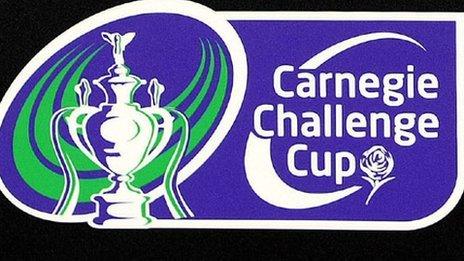Featherstone's famous final: When Rovers shocked Hull at Wembley
- Published
Featherstone's Hobbs inspires Cup upset
Allan Agar insists he does not own a copy of Featherstone Rovers' famous 1983 Challenge Cup final success against Hull FC., external
Even 30 years on he says he does not need one, it remains as clear as day in his mind.
Agar, now 63, was head coach of Rovers that afternoon at Wembley for one of the competition's greatest ever shocks.
"It was a great day, if you'd asked me at the start of the cup run if we would win the Challenge Cup, I would have said no," Agar told BBC Sport.
"The main priority was to stay in the First Division, I'd only taken over in the November and we were struggling, in the bottom three and it was three who went down then. We had secured our status by the time we got to Wembley but that was the main issue."
In the end his side just stayed up at the expense of Barrow, and having accounted for Batley, Salford, St Helens and Bradford en route to the final, the side from Post Office Road were handed the toughest task yet.
Hull, packed with the talents of David Topliss, James Leuluai and Gary Kemble, were the competition's holders and had finished top of the regular season table.
Yet it was not to be their day, as the Airlie Birds succumbed to Agar's underdogs under the old Twin Towers.
Four goals from Steve Quinn, including a late penalty after Hull were penalised for butting, and two tries from Lance Todd Trophy winner David Hobbs were enough to edge the 80 minutes in a 14-12 thriller.
"They [Hull] were [the best team], they brought the Kiwis and Australians over, they won the Championship that year, so we went down there with nothing to lose," Agar added.
"I put it over to the players that Hull might be a bit blasé in their approach, and the dress code on the day certainly was, with the white shoes and light grey suits.
"It's little things like that, to some people it's a show of arrogance, I've spoken to a few of the Hull players and they've almost openly acknowledged their preparations weren't the best, and we took advantage.
"There was no good fortune on the day, because I honestly thought we were the best side and played the best football.
"While you can say it's a controversial finish with the penalty, it was a headbutt [on Peter Smith] that was penalised, but overall in the 80 minutes I thought we were the best team."
Agar's side not only wrote their names in Challenge Cup folklore - some like Hobbs went on to represent Great Britain.
For others, like hooker Ray Handscombe, the final was a swansong they would never forget.
"I was 33 and coming to the end of my playing career, it was now or never," he said.
"My dad had throat cancer leading up to the Christmas of 1982 and was having treatment. He was in a bad way and wasn't going to make it much longer, and I kept telling him we were going to win the cup at Wembley this season and he said 'Yeah right, you've been telling me that for the last 16 years'.
"But we finally did, it was something very personal to me, and when we played I didn't think I was playing for myself, I felt I wasn't just representing myself.
"I was playing for the people who had backed me over many years and supported me. I've got one cup winners' medal, others may have six or seven, but I can't see how those would mean as much as that one does to me.
"It was 30 years ago but I think most people can remember exactly everything about it, if you achieve something and you are really proud of it, it's always fresh in your memory."
Rovers' success meant more to the town of Featherstone than just sporting achievement, it gave a community steeped in mining a lift when it needed it most.
A year before the national strike that would have lasting effects on the industry, and with genuine fear of job losses on the horizon, a Wembley cup final galvanised the local population.
"I've never worked in the pits, but my family had, and it did give the town a boost," Agar said.
"People were looking forward to it, whereas it was a matter-of-fact in some towns like Hull, where people were like "Well, if we lose we'll be back next year". For us it was ten years since we'd been there.
"There was a buzz in the town, we attended a few dos and functions in the pubs and clubs and you could feel the anticipation, people were willing it to happen.
"They all played their part, they gave the lads confidence to go down there and enjoy it and on the day the support was equal to Hull's."
Agar was no stranger to the showpiece occasion, having accounted for Hull as a player with city rivals Hull Kingston Rovers in 1980,, external but the pressures of coaching compared to playing, added to the romance of local loyalty, made Featherstone's success all the more significant.
"It has a special place. I think it's a bigger achievement to have coached a side at Wembley than to have played there," he added.
"You've just got to concentrate on your own job as a player but a coach has to plan all the training sessions and what you're going to do when you get down there. The lads are away from home and you don't know how they'll settle, you've got to keep an eye on everything."
The current Featherstone side has tried to follow in the footsteps of the class of 1967, 1973 and 1983.
Castleford were dumped out of the competition last season before Wigan ended their hopes and Sunday's fourth round tie against London Broncos offers Darryl Powell's Rovers the chance to open a new chapter in the club's cup history.
"I was there when they beat Castleford last season and they put up a good fight against Wigan, but the days of romance have gone out of the Challenge Cup now," Agar added.
"What ourselves and Sheffield did [beating Wigan in 1998], I don't think you'll ever see that again, money rules the game now."
Rovers' success marked something of an end to an era of cup shocks, as Widnes lifted the cup in 1984 and the Wigan machine started their dominance of the competition two seasons later.
For Agar it was the brightest spot in a career of highs, earning him the Man of Steel and his players a place in Challenge Cup history.
"We had some good players in that side, and some who were better than people gave them credit for," Agar said.
"They got their just rewards, I'll be forever grateful to them because thanks to them I've got a cup medal and I'll hold them in high esteem for the rest of my life."
- Published26 July 2013
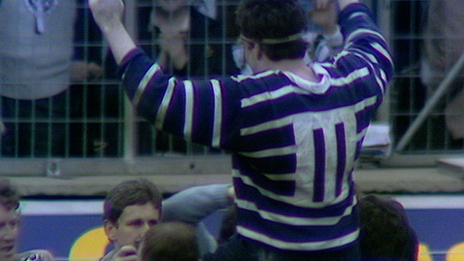
- Published18 April 2013
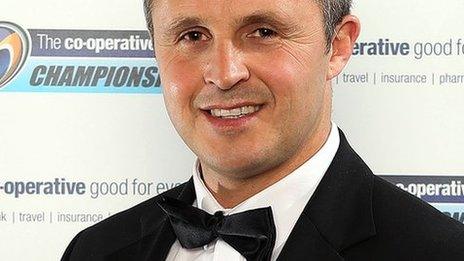
- Published8 April 2013
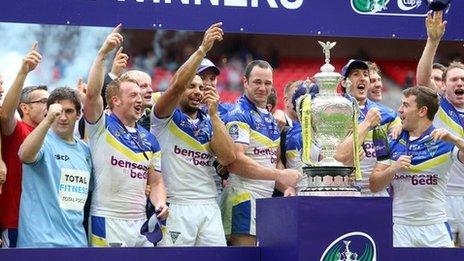
- Published27 April 2012
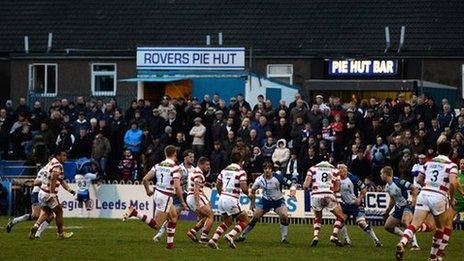
- Published14 April 2012
